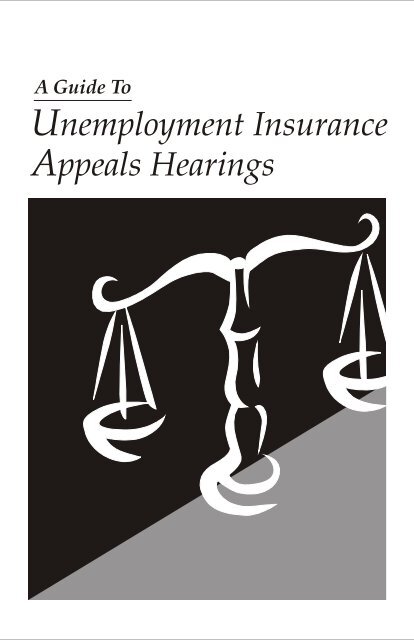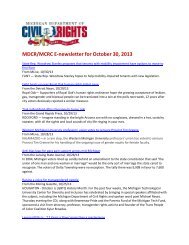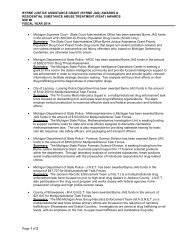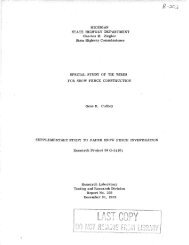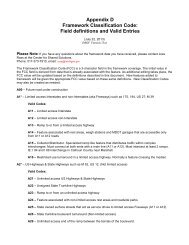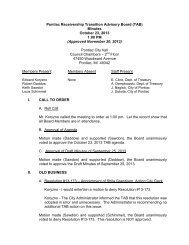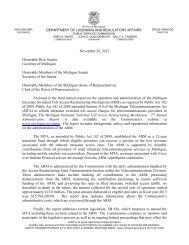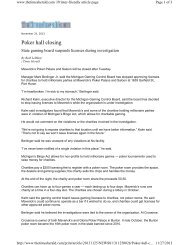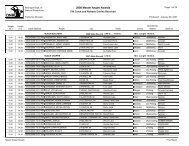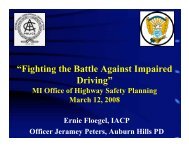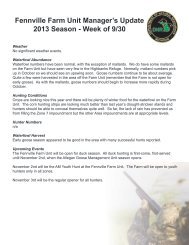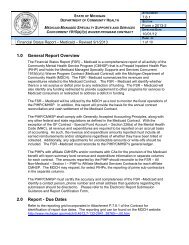Unemployment Insurance Appeals Hearings - State of Michigan
Unemployment Insurance Appeals Hearings - State of Michigan
Unemployment Insurance Appeals Hearings - State of Michigan
You also want an ePaper? Increase the reach of your titles
YUMPU automatically turns print PDFs into web optimized ePapers that Google loves.
A Guide To<br />
<strong>Unemployment</strong> <strong>Insurance</strong><br />
<strong>Appeals</strong> <strong>Hearings</strong>
Table <strong>of</strong> Contents<br />
Basic Terms Used At A Hearing .....................................................5-6<br />
Administrative Law Judge Parties<br />
Evidence Witnesses<br />
Why Is It Important To Attend The Hearing?...................................7<br />
What Happens First?........................................................................8-9<br />
Preparation Before The Hearing ..................................................9-11<br />
Who And What Should Be Brought To The Hearing?............. 11-12<br />
What Happens At The Hearing? ................................................13-16<br />
What Happens After The Hearing? ............................................16-17<br />
Burden Of Pro<strong>of</strong>: The Key To Making Your Best Case...................17<br />
Misconduct Cases .....................................................................17-18<br />
Voluntary Leaving Cases...........................................................18-19<br />
Refusal Of Suitable Work Cases ...................................................... 20<br />
Eligibility For Benefits ...................................................................21<br />
Liability/Tax Issues .......................................................................21<br />
Some Final Words ........................................................................21-22<br />
<strong>Michigan</strong> Supreme Court Definition Of “Misconduct” For<br />
<strong>Unemployment</strong> Compensation Cases.............................................23
INTRODUCTION<br />
<strong>Unemployment</strong> <strong>Insurance</strong> hearings are conducted by the <strong>State</strong><br />
Office <strong>of</strong> Administrative <strong>Hearings</strong> and Rules (SOAHR). The<br />
purpose <strong>of</strong> this booklet is to help you understand what happens at<br />
an unemployment insurance hearing, so you can make your best<br />
case to the Administrative Law Judge (ALJ). We hope that after you<br />
have read this booklet, you will understand whom and what to take<br />
to the hearing, what you must prove, and how to do so.<br />
The information in this booklet is not legally binding; it is provided<br />
for informational purposes only.<br />
Free Representation<br />
Independent Advocates are available to assist you in presenting<br />
your case before the Administrative Law Judges. THERE IS NO COST<br />
TO YOU FOR THE SERVICES OF AN ADVOCATE.<br />
One group <strong>of</strong> Advocates is available only to assist unemployed workers;<br />
the other group is available only to assist employers. The employer<br />
advocates will assist in both matters related to unemployment benefits<br />
and unemployment taxes.<br />
You can choose your own Advocate from among those available<br />
in your area. They have all passed a comprehensive examination<br />
regarding their knowledge <strong>of</strong> the unemployment insurance law and<br />
procedures.
The Advocacy Program is operated by the <strong>Unemployment</strong><br />
<strong>Insurance</strong> Agency (UIA). For more details about the Advocacy<br />
Program, call the UIA at 1-800-638-3994 and choose menu item<br />
#2. If you wish to have an Advocate represent you, call as soon as<br />
you have filed your appeal from the UIA’s Redetermination to the<br />
<strong>State</strong> Office Of Administrative <strong>Hearings</strong> and Rules (SOAHR).<br />
Basic Terms Used At A Hearing<br />
We’ll begin by explaining some <strong>of</strong> the terms used most <strong>of</strong>ten<br />
in a hearing.<br />
An ALJ is an attorney who works for the SOAHR, hearing and<br />
deciding cases involving unemployment compensation. The<br />
ALJ’s job is to hold a hearing to consider the evidence – oral<br />
and in writing – presented by all parties at the hearing. After<br />
this hearing, the ALJ issues a written decision making findings<br />
<strong>of</strong> fact and conclusions <strong>of</strong> law. The ALJ may also question the<br />
witness(es). The ALJ then decides how the law must be applied<br />
to those facts.<br />
Parties are the people whose rights might be affected by the<br />
outcome <strong>of</strong> an unemployment compensation case. There may be<br />
three parties at a hearing: the unemployed worker (the individual<br />
seeking the unemployment benefits), the employer (the business<br />
that is, or may be, charged for the payment <strong>of</strong> benefits, or whose<br />
tax rate or liability for taxes is in question), and the <strong>Unemployment</strong><br />
<strong>Insurance</strong> Agency (UIA).
If a case gets to the ALJ, it usually means that there is a disagreement<br />
about the previous UIA decision (redetermination). An employer<br />
may feel that the unemployment benefits should not be paid, or that<br />
the employer should not have to pay unemployment taxes, or that<br />
his/her tax rate is wrong. An unemployed worker may feel that the<br />
UIA should not have denied his or her claim for benefits. The UIA<br />
may be at the hearing to support its previous rulings.<br />
Evidence can be anything used by a party to convince the ALJ<br />
about the facts <strong>of</strong> the case.<br />
The most common type <strong>of</strong> evidence is called testimony, which<br />
means statements made, under oath or affirmation, at the hearing,<br />
by a party or one <strong>of</strong> the party’s witnesses, who has first-hand<br />
knowledge <strong>of</strong> the events.<br />
Evidence can also be in written form, but there must be someone<br />
present at the hearing who can testify (give testimony) from their<br />
own knowledge about any documents. In reaching a decision later,<br />
the ALJ must decide how much importance to give to each statement<br />
or document admitted as evidence.<br />
Witnesses are people who are brought or subpoenaed (ordered<br />
to appear) to the hearing by either party to give testimony about<br />
facts they personally know about. The ALJ may limit the number <strong>of</strong><br />
witnesses testifying about the same facts.<br />
These are the terms we’ll need to get started. Throughout the rest<br />
<strong>of</strong> this booklet, we’ll be explaining some additional terms, as they<br />
come up.
Why Is It Important To Attend The Hearing?<br />
There are several reasons why it is important for you to attend the<br />
hearing:<br />
1. If you are the party who appealed the case and you do not appear at<br />
the hearing, the ALJ may dismiss the case (that is, cancel the appeal)<br />
for lack <strong>of</strong> prosecution (that is, failure to appear to carry forward the<br />
appeal). This means the UIA redetermination is affirmed.<br />
2. If you are the party required to “make the case,” and you are not<br />
present at the hearing, then no one will be present at the hearing<br />
to “make the case.” You will probably lose.<br />
3. The ALJ attaches importance only to sworn testimony, and to<br />
documents supported by sworn testimony. For that reason, even<br />
though the UIA may have agreed with your point-<strong>of</strong> view in the past,<br />
the ALJ must take a fresh look at the evidence, and cannot give much<br />
weight to the documents found in the file unless someone is at the<br />
hearing to testify about them.<br />
4. The hearing is generally your last chance in the appeal process to<br />
present the facts <strong>of</strong> your case. Even though there are further steps<br />
available in the appeal process after the hearing, with rare exceptions<br />
the only evidence that will be taken into consideration during the<br />
rest <strong>of</strong> the appeal process is the evidence presented at the hearing.<br />
<strong>Appeals</strong> to the Board <strong>of</strong> Review and the courts usually involve only<br />
arguments about the law, not about the evidence. For that reason,<br />
the administrative hearing is critical in the appeal process.
What Happens First?<br />
The Agency first issues a decision called a Determination, which<br />
tells whether unemployment benefits will be paid, how much will<br />
be paid per week, and how many weeks will be paid. If either party<br />
disagrees with the Determination, they can protest, indicating<br />
their reasons for disagreeing. The Agency will review the case<br />
and issue a redetermination. The Redetermination may affirm the<br />
Determination, or it may modify or reverse the Determination.<br />
One <strong>of</strong> the parties (unemployed worker or employer) may disagree<br />
with the Redetermination. That party sends or delivers to the Agency<br />
a written appeal, asking for a hearing before an ALJ <strong>of</strong> the <strong>State</strong><br />
Office <strong>of</strong> Administrative Hearing and Rules.<br />
If the appeal is received on time, it is scheduled for a hearing. If the<br />
appeal is received late, the ALJ must dismiss the appeal. However, if a<br />
party withdraws the late appeal before the hearing, and the appealing<br />
party requests the UIA reconsider its last decision, then the Agency<br />
will determine whether the reason for the lateness <strong>of</strong> the appeal<br />
amounts to “good cause.” If good cause is found the lateness <strong>of</strong> the<br />
protest or appeal will be excused. If the appealing party appeals an<br />
adverse UIA decision, the ALJ will issue an order either finding or<br />
not finding good cause, and will make a decision about the issue <strong>of</strong><br />
the case.<br />
After the appeal is filed, all parties will receive a Notice <strong>of</strong> Hearing,<br />
telling them where and when the hearing will take place. The hearing<br />
is held either at a regional hearing location or by telephone.
The <strong>State</strong> Office <strong>of</strong> Administrative <strong>Hearings</strong> and Rules mails the<br />
Notice <strong>of</strong> Hearing at least 10 days before the scheduled hearing date<br />
(or 20 days in advance for a fraud case.) The back <strong>of</strong> the Notice<br />
<strong>of</strong> Hearing contains some very important information you need to<br />
review about the hearing. Be sure to read it carefully before the<br />
date <strong>of</strong> the hearing!<br />
Preparation Before The Hearing<br />
You are entitled to have an attorney, or an Advocate from the UIA’s<br />
Advocacy Program, or other representation with you at the hearing,<br />
although representation is not required. If either party does not have<br />
an attorney, Advocate or representative at the hearing, the ALJ will<br />
ask questions. Each party should also be prepared to ask questions <strong>of</strong><br />
all witnesses. If you or your attorney, Advocate, or representative, or<br />
a witness are unable to attend the hearing, you may write to the ALJ<br />
or call the ALJ’s <strong>of</strong>fice and request an adjournment (postponement)<br />
<strong>of</strong> the hearing, giving the reasons for the request.<br />
The ALJ will only grant adjournments for exceptionally good reasons.<br />
Generally, having another appointment which could be rescheduled<br />
is not a sufficient reason for an adjournment. In an emergency,<br />
call the ALJ’s <strong>of</strong>fice before the hearing and explain the situation.<br />
Sometimes, if not all necessary witnesses are available, the hearing<br />
is held with the available witnesses, and the hearing is concluded on<br />
another day.<br />
Even if you choose to represent yourself, you need to decide whether<br />
to have witnesses at the hearing. You should ask your witnesses to
participate in the hearing well in advance <strong>of</strong> the hearing and tell<br />
them the date and time <strong>of</strong> the hearing.<br />
Advise your witnesses to tell the truth about what happened, but do<br />
not tell them what to say or how to say it.<br />
If a witness might not appear voluntarily, you may obtain a subpoena<br />
to require that person to appear. The subpoena may be obtained<br />
from the UIA or the ALJ’s <strong>of</strong>fice. The party should give the witness<br />
the subpoena in a reasonable time before the scheduled hearing.<br />
The UIA will not deliver subpoenas for the party. After the hearing,<br />
a person who appears at a hearing under subpoena can receive a<br />
small fee for his or her time, as well as mileage. This fee will be paid<br />
and mailed by the UIA.<br />
If the case involves a quit or a firing, the parties should bring as<br />
witnesses those persons who have personal knowledge <strong>of</strong> the details<br />
<strong>of</strong> the quit or firing, such as a supervisor or co-worker.<br />
Since you will have an opportunity at the hearing to ask questions <strong>of</strong><br />
the other party and their witnesses, you should consider asking the<br />
ALJ’s <strong>of</strong>fice, in advance <strong>of</strong> the hearing, if you can look at the case file.<br />
From the file, you can see what statements the other party made to<br />
the UIA. Often, those are the same statements they will make at the<br />
hearing. Knowing what statements the other party will likely make<br />
may help you in deciding who your witnesses should be, and what<br />
questions you should ask the other party.<br />
Before the hearing, it is a good idea to write down questions you<br />
wish to ask the other party, as well as important points you wish to<br />
make on your own behalf. Take your notes to the hearing; they will<br />
10<br />
10
give you added confidence and allow the hearing to proceed more<br />
smoothly. However, because your notes can only be used to refresh<br />
your memory, your testimony cannot consist <strong>of</strong> reading your notes<br />
aloud.<br />
Before the hearing, decide what documents (attendance records,<br />
employer policy statements, doctors’ statements, check stubs) you<br />
will need to make your case. Also, be sure to take the witnesses who<br />
can testify as to their own knowledge <strong>of</strong> the documents. Doctors’<br />
statements and government records (such as safety inspection reports)<br />
may generally be admitted without the presence <strong>of</strong> a witness.<br />
If you are hearing-impaired or have difficulty speaking or<br />
understanding English, you may request that a qualified interpreter<br />
attend the hearing to translate for you. If you need an interpreter,<br />
you should notify the ALJ’s <strong>of</strong>fice as early as possible. If you take<br />
your own interpreter, the ALJ may postpone the hearing until the<br />
ALJ’s <strong>of</strong>fice can schedule an independent interpreter.<br />
Who And What Should Be Taken To The<br />
Hearing?<br />
Naturally, the unemployed worker and employer should attend<br />
the hearing. Unemployed workers should attend because their<br />
right to benefits is in question. Employers should attend because<br />
the ALJ’s decision may affect their liability or cause their accounts<br />
to be charged for benefits paid. (Sometimes, a representative <strong>of</strong> the<br />
UIA also attends the hearing.) The ALJ may also permit observers<br />
at the hearing.<br />
11
In deciding whom, if anyone, you should present as a witness, it<br />
is important to keep in mind that the hearing operates within the<br />
general requirements <strong>of</strong> the rules <strong>of</strong> evidence much like a court.<br />
The ALJ will not accept most hearsay testimony, that is, testimony<br />
not within the witness’s own first-hand knowledge. For example,<br />
the ALJ cannot permit a party or witness to answer a question by<br />
saying “I don’t know what happened, but from what Joe tells me....”<br />
If “Joe” knows what happened, then “Joe” should have appeared at<br />
the hearing. Nobody else can testify as to what “Joe” would have said<br />
had he been at the hearing. If, for example, a worker’s attendance is<br />
at issue, the person with the most personal knowledge should appear<br />
as a witness to describe the worker’s attendance and any warnings<br />
given by the employer to the worker.<br />
In addition to presenting witnesses with personal knowledge <strong>of</strong><br />
the facts, parties may wish to introduce documents to support the<br />
testimony <strong>of</strong> the witnesses. Documents include such things as<br />
attendance records, written warnings, dates <strong>of</strong> verbal warnings, lay<strong>of</strong>f<br />
notices, and letters or other correspondence that bear on the case.<br />
The employer’s keeper <strong>of</strong> business records should be present at the<br />
hearing to testify about them, and to testify that they are the actual<br />
records.<br />
Another reason it is important to present witnesses, in addition to<br />
documents, is that only a person who is present at the hearing (in<br />
person or by phone) can be cross-examined by the other party. A<br />
notarized statement generally cannot, therefore, be used at the<br />
hearing in place <strong>of</strong> a witness.<br />
1<br />
1
What Happens At The Hearing?<br />
When parties scheduled for an in-person hearing arrive at a regional<br />
location <strong>of</strong> the <strong>State</strong> Office <strong>of</strong> Administrative <strong>Hearings</strong> and Rules,<br />
they should first notify the information clerk <strong>of</strong> their arrival and/or<br />
sign the sign-in sheet.<br />
The parties (and their attorneys, representatives, Advocates, witnesses,<br />
and any others) are then directed to a waiting area. It is a good idea<br />
to arrive at the hearing location 10 or 15 minutes early.<br />
The ALJ calls the case and decides who can enter the hearing room.<br />
The ALJ sits at a desk, or sometimes behind a judge’s bench, and<br />
the parties and their witnesses and representatives usually sit at a<br />
table in front <strong>of</strong> the ALJ’s desk. The ALJ will direct the parties and<br />
witnesses where to sit.<br />
The ALJ begins by introducing him- or herself by name, making sure<br />
he or she has the names <strong>of</strong> all the parties, witnesses, representatives,<br />
Advocates and attorneys.<br />
<strong>Hearings</strong> are tape recorded. If an appeal is later taken, the tape<br />
recording is typed up as a transcript. It is the transcript that is<br />
reviewed at higher levels <strong>of</strong> appeal. It is important for everyone to<br />
speak loudly and slowly, and not rustle papers or interrupt others,<br />
so that a clear recording can be made. The transcript and the<br />
documents which are accepted as exhibits become the “record” <strong>of</strong><br />
the hearing that is reviewed at higher levels <strong>of</strong> appeal.<br />
1
The ALJ asks the parties and witnesses to raise their right hands, and<br />
then administers an oath or affirmation to each <strong>of</strong> the parties and<br />
witnesses, asking them to swear or affirm that they will tell the truth,<br />
the whole truth, and nothing but the truth.<br />
The ALJ then identifies each <strong>of</strong> the participants in the hearing for<br />
the record, and summarizes the issue being appealed and the UIA’s<br />
Redetermination.<br />
Often, the ALJ requests that the witnesses be sequestered, that is,<br />
asked to sit outside the hearing room while the other witnesses are<br />
testifying, so that the witnesses are not influenced by each other’s<br />
testimony. An ALJ may also determine that the testimony <strong>of</strong> the<br />
witnesses is “cumulative,” that is, that they will all be testifying to the<br />
same set <strong>of</strong> facts. In that case, the ALJ may accept the testimony <strong>of</strong><br />
only one <strong>of</strong> the witnesses, and not permit the party’s other witnesses<br />
to testify.<br />
The ALJ usually asks the party with the burden <strong>of</strong> pro<strong>of</strong> to present his<br />
or her case first. There is a more complete discussion <strong>of</strong> who has the<br />
burden <strong>of</strong> pro<strong>of</strong>, and what that means, on page 17 <strong>of</strong> this booklet.<br />
If the party with the burden <strong>of</strong> pro<strong>of</strong> has a representative, Advocate,<br />
or attorney, that person usually asks the party and the witnesses<br />
questions. This process is called direct examination. If the party<br />
with the burden <strong>of</strong> pro<strong>of</strong> does not have a representative, Advocate,<br />
or attorney, the ALJ may ask the questions. Even if the party has a<br />
representative, Advocate, or attorney, the ALJ may ask additional<br />
questions to clarify testimony. The ALJ will also give the party with<br />
the burden <strong>of</strong> pro<strong>of</strong> an opportunity to present his or her case in<br />
narrative fashion.<br />
1<br />
1
After the party with the burden <strong>of</strong> pro<strong>of</strong> presents testimony, the<br />
other party has the opportunity to ask questions <strong>of</strong> each witness.<br />
This is called cross-examination. If the party has a representative,<br />
Advocate, or attorney, that person conducts the cross-examination;<br />
if the party does not have a representative, Advocate, or attorney,<br />
the ALJ conducts the cross-examination, or may ask the party to do<br />
so. Next, the other party presents direct testimony, and that party’s<br />
witnesses may be cross-examined.<br />
Sometimes during a hearing, an issue comes up that was not originally<br />
part <strong>of</strong> the case, and was not indicated on the Notice <strong>of</strong> Hearing. In<br />
that situation, the ALJ permits an adjournment to allow the parties<br />
to prepare for that issue. If they feel prepared to give evidence<br />
on the new issue, the parties can agree to give up their right to an<br />
adjournment, and continue with the hearing.<br />
The ALJ is responsible for getting all <strong>of</strong> the information needed to<br />
fully understand the facts <strong>of</strong> the case. An important function <strong>of</strong> the<br />
ALJ is fact-finding. In some cases, this may mean that the ALJ takes<br />
over the function <strong>of</strong> direct- or cross-examination, and that the ALJ<br />
will exclude the testimony <strong>of</strong> some witnesses.<br />
The ALJ is also responsible for ensuring that the rules <strong>of</strong> evidence<br />
are generally followed throughout the hearing. For that reason, the<br />
ALJ may rule that certain testimony is hearsay or is not relevant to<br />
the case and cannot be allowed, or that certain documents cannot<br />
be accepted, or that the testimony <strong>of</strong> certain witnesses will not be<br />
permitted.<br />
1
The ALJ is responsible for directing the progress <strong>of</strong> the hearing.<br />
When the ALJ attempts to closely control the hearing, he or she is<br />
not being rude. Rather, the ALJ is ensuring that the hearing is not<br />
prolonged by testimony unrelated to the issues.<br />
At the conclusion <strong>of</strong> the hearing, the ALJ may give the parties an<br />
opportunity to make closing statements, summarizing their positions<br />
on the issues in the case if the ALJ believes such statements will assist<br />
him or her in deciding the facts <strong>of</strong> the case.<br />
The procedures followed at in-person hearings are also followed for<br />
hearings held by telephone, as much as possible.<br />
What Happens After The Hearing?<br />
After the hearing, the ALJ reviews the testimony <strong>of</strong> the parties,<br />
some <strong>of</strong> which may conflict as to the facts. The ALJ may also take<br />
into account the demeanor <strong>of</strong> the parties and their witnesses, that<br />
is, the manner in which they presented testimony and answered<br />
questions and the consistency <strong>of</strong> a witness’s testimony. This may<br />
help the ALJ determine the credibility (believability) <strong>of</strong> the parties<br />
and witnesses.<br />
Based on these factors, the ALJ makes “findings <strong>of</strong> fact,” that are<br />
included in the ALJ’s written decision. In addition, the ALJ decides<br />
how the unemployment compensation law applies to the facts <strong>of</strong><br />
the case, and makes conclusions <strong>of</strong> law. The most important factor<br />
the ALJ uses in making his or her decision is this: HAS THE PARTY<br />
WITH THE BURDEN OF PROOF SUCCESSFULLY MET THAT<br />
BURDEN? (See page 17 <strong>of</strong> this booklet for information about Burden<br />
<strong>of</strong> Pro<strong>of</strong>.)<br />
1<br />
1
The ALJ will usually issue a decision within 60 days <strong>of</strong> the date <strong>of</strong> the<br />
hearing. Any losing party may appeal the decision to the <strong>Michigan</strong><br />
Employment Security Board <strong>of</strong> Review. The last page <strong>of</strong> the decision<br />
includes information about how to appeal. It is also possible to<br />
request a rehearing before the ALJ, but this will be granted only at<br />
the discretion <strong>of</strong> the ALJ, based upon the reason stated in the request<br />
for rehearing.<br />
The ALJ cannot talk about the case with a party, before or after the<br />
hearing, because this would be unfair to the absent party. Thus, the<br />
ALJ cannot take a party’s telephone call. The ALJ’s <strong>of</strong>fice personnel<br />
can answer questions about the scheduling <strong>of</strong> the case or issuance<br />
<strong>of</strong> the decision.<br />
Burden Of Pro<strong>of</strong>:<br />
The Key To Making Your Best Case<br />
In every hearing, the ALJ’s attention is focused on one primary<br />
issue: Has the party with the burden <strong>of</strong> pro<strong>of</strong> carried that burden by<br />
substantial evidence, with first-hand testimony, and other admissible<br />
evidence?<br />
Misconduct Cases<br />
In a misconduct case, the burden is always on the employer to<br />
prove:<br />
(1) That the unemployed worker engaged in misconduct, and<br />
(2) That the misconduct occurred in connection with the work.<br />
1
In unemployment compensation cases, the <strong>Michigan</strong> Supreme Court<br />
has defined “misconduct” as a willful or wanton disregard <strong>of</strong> the<br />
employer’s interest, or negligence <strong>of</strong> such seriousness as to imply<br />
disregard <strong>of</strong> the employer’s interest.<br />
However, the mere inability to do the job, or a good faith error in<br />
judgment, is not considered misconduct. In some cases, the employer<br />
may have a perfectly good and valid reason to discharge an employee,<br />
but that reason still might not amount to misconduct for purposes<br />
<strong>of</strong> the unemployment compensation law.<br />
The exact wording <strong>of</strong> the <strong>Michigan</strong> Supreme Court definition <strong>of</strong><br />
misconduct is found on page 23 <strong>of</strong> this booklet.<br />
The employer may need to show, through testimony and, if possible,<br />
documents, that (1) the employer had a policy on the particular<br />
conduct involved; (2) the employer applied the policy equally to all<br />
employees; and (3)the employer had not previously condoned the<br />
actions that resulted in the discharge. In some cases, it is useful for the<br />
employer to show that the unemployed worker had received warnings<br />
about infractions, but that the unemployed worker continued in the<br />
misconduct after the warnings.<br />
However, where the employee’s misconduct is a serious <strong>of</strong>fense, the<br />
employer need not warn the employee prior to discharge.<br />
Voluntary Leaving Cases<br />
In a voluntary leaving case, the burden is on the unemployed worker<br />
to prove:<br />
1<br />
1
(1) That the leaving was voluntary but with good cause attributable<br />
to the employer, or<br />
(2) That the leaving was involuntary (for example, due to<br />
personal health reasons).<br />
To show that a leaving was with good cause attributable to the<br />
employer, the unemployed worker must prove that some condition<br />
existed that would have made continued employment unacceptable<br />
to a reasonable person. This condition must have been brought to<br />
the employer’s attention and the employer failed to correct it.<br />
Unsafe working conditions, failure to pay wages when due, or failure<br />
to provide promised benefits or promotions (things over which the<br />
employer has control but fails to correct) are examples <strong>of</strong> situations<br />
that could amount to good cause attributable to the employer for<br />
the worker to voluntarily leave a job.<br />
To prove that a leaving was involuntary, the unemployed worker<br />
may, for example, prove that a health reason, verified by a doctor,<br />
prevented the worker from continuing to do the job, that the worker<br />
informed the employer <strong>of</strong> this fact and tried to find another job with<br />
the same employer, but that the employer was unable or unwilling<br />
to do so. (However, a person who is unable to do any work he or she<br />
has done in the past, or work he or she was trained to do, is no longer<br />
part <strong>of</strong> the labor force, and would not be eligible for unemployment<br />
benefits until again able to work.)<br />
1
Refusal Of Suitable Work Cases<br />
In a refusal <strong>of</strong> suitable work case, the burden <strong>of</strong> pro<strong>of</strong> is on the<br />
employer to show:<br />
(1) That the employer made an <strong>of</strong>fer <strong>of</strong> work to the unemployed<br />
worker;<br />
(2) That the work <strong>of</strong>fered was suitable;<br />
(3) That the <strong>of</strong>fer was for a job that really existed;<br />
(4) That the <strong>of</strong>fer was specific; and<br />
(5) That the unemployed worker refused the <strong>of</strong>fer.<br />
Elements <strong>of</strong> suitability <strong>of</strong> a job include wages, distance from the<br />
worker’s residence, length <strong>of</strong> unemployment, and risk to the<br />
unemployed worker’s health, safety, or morals.<br />
The burden then shifts to the unemployed worker to show that he<br />
or she had good cause to refuse the <strong>of</strong>fered suitable work.<br />
Eligibility For Benefits<br />
In an eligibility case, the burden <strong>of</strong> pro<strong>of</strong> is always on the unemployed<br />
worker to prove that he or she filed a claim and, for every week he<br />
or she is claiming benefits, he or she was:<br />
(1) Able to work;<br />
(2) Available for full-time, suitable work;<br />
(3) Actively seeking work, unless this requirement has been<br />
excused; and<br />
(4) Reporting for benefits as directed by the UIA, or had good<br />
cause for not reporting or filing as directed.<br />
It is a good idea for the unemployed worker to keep notes about<br />
where he/she looked for work each week, and to take these notes<br />
to the hearing.<br />
0<br />
0
Liability/Tax Issues<br />
An employer’s liability/tax issues may include, but are not limited<br />
to, the following:<br />
• The employer believes that he/she should not have been determined<br />
liable to pay unemployment taxes<br />
• The employer believes that he/she should not have been determined<br />
a successor <strong>of</strong> another employer’s business<br />
• The employer disagrees with the tax rate.<br />
If appealing these issues, the employer must bring supporting<br />
documents to the hearing, as well as appropriate witnesses.<br />
Some Final Words<br />
The best advice for parties appearing before an ALJ is to be prepared<br />
for the hearing:<br />
1. Know what the issue (question) before the ALJ is. It is indicated<br />
in the Notice <strong>of</strong> Hearing. Also, read the important information<br />
on the back <strong>of</strong> the Notice <strong>of</strong> Hearing.<br />
2. Know who has the burden <strong>of</strong> pro<strong>of</strong>.<br />
3. Know what has to be proved in order to carry that burden <strong>of</strong><br />
pro<strong>of</strong>.<br />
4. Review the file in advance, so that you can plan the major points<br />
you wish to make, and can plan the questions you wish to ask the<br />
other party.<br />
5. Take to the hearing the necessary papers and witnesses. Make<br />
sure that the witnesses are persons who can <strong>of</strong>fer testimony as to<br />
their own knowledge.<br />
6. Arrive at the hearing on time.<br />
1
If the decision <strong>of</strong> the ALJ is not in your favor, you may either request<br />
a rehearing before the ALJ (for example, if you have additional facts<br />
that were not available to you at the time <strong>of</strong> the original hearing),<br />
or you may appeal the ALJ’s decision to the <strong>Michigan</strong> Employment<br />
Security Board <strong>of</strong> Review, which is a separate agency from the UIA<br />
and from the <strong>State</strong> Office <strong>of</strong> Administrative <strong>Hearings</strong> and Rules. The<br />
30-day time limits for filing either a request for rehearing before the<br />
ALJ, or an appeal to the Board <strong>of</strong> Review, will be on the last page <strong>of</strong><br />
the ALJ’s decision.<br />
You must file within the time limits given. If your request for a<br />
rehearing is late but within one year <strong>of</strong> the ALJ’s decision, your<br />
request will be considered to be a request for a reopening <strong>of</strong> the<br />
case before the ALJ, who will then have to decide whether you have<br />
“good cause” for requesting a reopening.<br />
When it receives an appeal, the Board <strong>of</strong> Review reviews the transcript<br />
<strong>of</strong> the ALJ hearing, which is the written form <strong>of</strong> the tape recording<br />
made at the hearing. The Board <strong>of</strong> Review will then decide whether<br />
the ALJ properly weighed the facts presented at the hearing and<br />
properly applied the law to the facts. Occasionally, if requested by<br />
the parties, the Board <strong>of</strong> Review will allow parties to appear in person<br />
before the Board to present oral arguments.<br />
We believe that if you follow the suggestions made in this booklet,<br />
you will be able to make your best case. We hope that by reading this<br />
booklet, you will know how to prepare for the hearing and what to<br />
expect, and will feel more at ease when attending the hearing.
In addition, the <strong>State</strong> Office <strong>of</strong> Administrative <strong>Hearings</strong> and Rules<br />
welcomes your comments about your hearing and about this booklet<br />
(what should be added, what needs clarification, etc.). Please<br />
direct your comments, in writing, to the Director, <strong>State</strong> Office <strong>of</strong><br />
Administrative <strong>Hearings</strong> and Rules, 611 W. Ottawa, 2nd Floor,<br />
Lansing, <strong>Michigan</strong> 48933.<br />
****<br />
The following is the definition <strong>of</strong> misconduct adopted by the<br />
<strong>Michigan</strong> Supreme Court in the case <strong>of</strong> Carter v Employment Security<br />
Commission, 364 Mich 538, 541 (1961):<br />
“[Misconduct in an unemployment compensation case is] ... conduct<br />
evincing such wilful or wanton disregard <strong>of</strong> an employer’s interests<br />
as is found in deliberate violations or disregard <strong>of</strong> standards <strong>of</strong><br />
behavior which the employer has the right to expect <strong>of</strong> his employee,<br />
or in carelessness or negligence <strong>of</strong> such degree or recurrence as to<br />
manifest equal culpability, wrongful intent or evil design, or to show<br />
an intentional and substantial disregard <strong>of</strong> the employer’s interests<br />
or <strong>of</strong> the employee’s duties and obligations to his employer. On the<br />
other hand, mere inefficiency, unsatisfactory conduct, failure in good<br />
performance as the result <strong>of</strong> inability or incapacity, inadvertencies<br />
or ordinary negligence in isolated instances, or good faith errors in<br />
judgment or discretion are not to be deemed ‘misconduct’ within<br />
the meaning <strong>of</strong> the [unemployment compensation] statute.”
SOAHR - 1800<br />
(Rev. 6-08)<br />
Keith W. Cooley<br />
Director<br />
<strong>State</strong> <strong>of</strong> <strong>Michigan</strong><br />
Department <strong>of</strong> Labor & Economic Growth<br />
<strong>State</strong> Office <strong>of</strong> Administrative<br />
<strong>Hearings</strong> & Rules<br />
Paid for with Federal funds.<br />
Copies - 0; Cost - $0 (¢/copy)<br />
© 2008<br />
Jennifer M. Granholm,<br />
Governor


